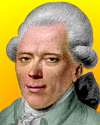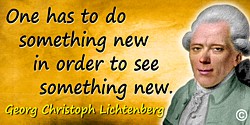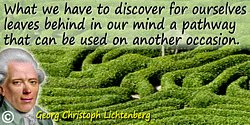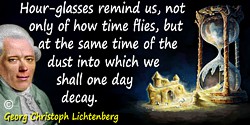 (source)
(source)
|
Georg Christoph Lichtenberg
(1 Jul 1742 - 24 Feb 1799)
German physicist and writer most widely known for his satire and aphorisms, but as a scientist, Lichtenberg did research in a wide variety of fields, including geophysics, volcanology, meteorology, chemistry, astronomy, mathematics, but especially physics. He discovered the basic physical process later used in xerographic copiers.
|
Georg Christoph Lichtenberg Quotes on Nature (6 quotes)
>> Click for 73 Science Quotes by Georg Christoph Lichtenberg
>> Click for Georg Christoph Lichtenberg Quotes on | Belief | Discovery | Genius | Man | Science | Theory | Thinking | Truth | World |
>> Click for 73 Science Quotes by Georg Christoph Lichtenberg
>> Click for Georg Christoph Lichtenberg Quotes on | Belief | Discovery | Genius | Man | Science | Theory | Thinking | Truth | World |
Everywhere in nature we seek some certainty, but all this is nothing more than an arrangement of the dark feeling of our own. All the mathematical laws that we find in Nature are always suspicious to me, despite their beauty. They give me no pleasure. They are merely expedients. Everything is not true at close range.
— Georg Christoph Lichtenberg
From the original German, in Physikalische und Mathematische Schriften (1806), Vol. 4, 145, “Wir suchen in der Natur überall eine gewisse Bestimmtheit, aber das Alles ist weiter nichts, als Anordnung des dunkeln Gefühls unserer eigenen. Alle mathematischen Gesetze, die wir in der Natur finden, sind mir trotz ihrer Schönheit immer verdächtig. Sie Freuen mich nicht. Sie sind bloss Hülfsmittel. In der Nähe ist Alles nicht wahr.” English version by Webmaster using Google translate.
It is very much in the order of nature that toothless animals should have horns: is it any wonder that old men and women should often have them?
— Georg Christoph Lichtenberg
Aphorism 6 in Notebook E (1775-1776), as translated by R.J. Hollingdale in Aphorisms (1990). Reprinted as The Waste Books (2000), 62.
Now that we know nature thoroughly, a child can see that in making experiments we are simply paying nature compliments. It is no more than a ceremonial ritual. We know the answers in advance. We consult nature in the same way as great rulers consult their parliaments.
— Georg Christoph Lichtenberg
Aphorism 67 in Notebook E (1775-1776), as translated by R.J. Hollingdale in Aphorisms (1990). Reprinted as The Waste Books (2000), 73.
The more experiences and experiments accumulate in the exploration of nature, the more precarious the theories become. But it is not always good to discard them immediately on this account. For every hypothesis which once was sound was useful for thinking of previous phenomena in the proper interrelations and for keeping them in context. We ought to set down contradictory experiences separately, until enough have accumulated to make building a new structure worthwhile.
— Georg Christoph Lichtenberg
Lichtenberg: Aphorisms & Letters (1969), 61.
When they have discovered truth in nature they fling it into a book, where it is in even worse hands.
— Georg Christoph Lichtenberg
Aphorism 62 in Notebook E (1775-1776), as translated by R.J. Hollingdale in Aphorisms (1990). Reprinted as The Waste Books (2000), 73.
You can be sure you are acting in accordance with the designs of nature if what you do is calculated to promote nature's great final purpose: grow and make grow. I am firmly convinced of the universality of this law.
— Georg Christoph Lichtenberg
Aphorism 44 in Notebook D (1773-1775), as translated by R.J. Hollingdale in Aphorisms (1990). Reprinted as The Waste Books (2000), 50.
See also:
- 1 Jul - short biography, births, deaths and events on date of Lichtenberg's birth.



 In science it often happens that scientists say, 'You know that's a really good argument; my position is mistaken,' and then they would actually change their minds and you never hear that old view from them again. They really do it. It doesn't happen as often as it should, because scientists are human and change is sometimes painful. But it happens every day. I cannot recall the last time something like that happened in politics or religion.
(1987) --
In science it often happens that scientists say, 'You know that's a really good argument; my position is mistaken,' and then they would actually change their minds and you never hear that old view from them again. They really do it. It doesn't happen as often as it should, because scientists are human and change is sometimes painful. But it happens every day. I cannot recall the last time something like that happened in politics or religion.
(1987) -- 


